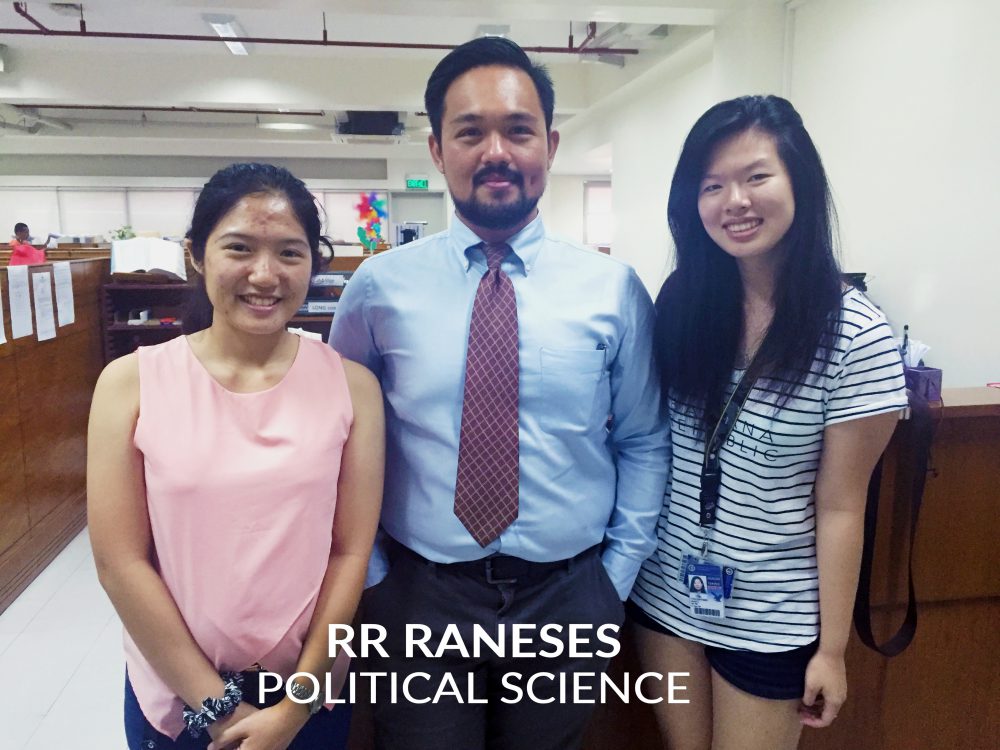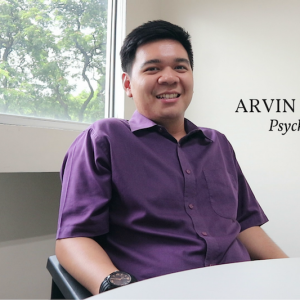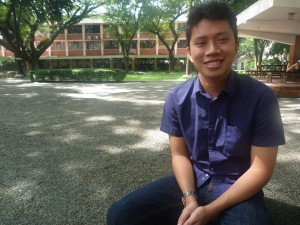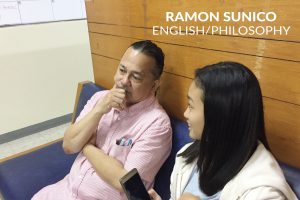In light of Teacher’ Appreciation Week this year, Irish Tolentino and Jannina Ong interviewed Political Science (POS) professor RR Rañeses about his thoughts on academics and politics. He also gave some life advice below:
Irish Tolentino (IT): How long have you been teaching?
RR Rañeses (RR): Ten years.
IT: What inspired you to become a teacher in the first place?
RR: My own professors—their passion and the way I was mentored. I thought of [teaching] as a way of giving back to them and the university. Also, this need to form minds—I find great joy in being able to influence the way people think in a formative level, so as to help them appreciate the realities.
IT: You mentioned in class that teaching is your hobby. How is it your hobby?
RR: [Teaching] is a hobby in a way that I don’t see it as work. Although it’s a lot of work and preparation to be able to plot the kind of outcomes I want to see from students, it’s fun. It’s something fun for me.
Jannina Ong (JO): I’m sure you’ve had a lot of students who are pasaway and matigas [ang ulo] (I’m sure you’ve had a lot of naughty, hardheaded students). What makes you keep pursuing the teaching career?
RR: I want those kids in my class because I want to give them a chance to see beyond their own limitations, but at the same time provide them with an environment to do that without too much pressure. Right now, I’m teaching POS 100, which is more of an appreciation course and does not demand the kind of rigidity and technicality that I demand from Political Science majors. I really like those matigas ang ulo kids because they make learning fun and push me to my limits. [They] challenge me to be extra creative in terms of making sure that they learn something from the university.
IT: How would you describe your teaching style? For those who are not your students, how would you sell yourself [as a teacher]?
RR: I’m not organized. I’m an auditory learner, so I like talking and hearing people more than presenting Powerpoint [presentations]. A lot of it is based on my mood, but lately I have been trying to harness the best of my mood before class. I don’t like selling myself because I don’t want people [choosing] me for the experience. I want them to look at the course itself. I’m just there to deliver a course that they will find useful in life at the end.
IT: Did you know that on Twitter, there is such a thing called, “The RR Raneses Experience”? They take a picture of the whiteboard and post it online.
RR: Really? Why is it that those do not come out in my alerts? (laughs) Just kidding. I write while I think. I’m not like other teachers who have an outline because I want to draw from what the students get. The scary factor is just there to pressure students. My point is [that] I want my students and I to do learning as a partnership. That’s why I have recitations to test them or to have something to say about topics so that we can form it. It’s Socratic. Socrates starts from where you are, goes there, and you both go to the next stage together. That’s why I always tell my students [that] I get mad not because you don’t know the answer, but because you’re too scared to respond [with] an answer. I like classes where students make mistakes and laugh about it then move to the next level.
JO: What is your most precious takeaway from your students?
RR: The learning experience is not something you can force into students. You can only give them an opening, and that learning is really something that students have to do themselves. Learning needs cultivation. You can’t pressure students into learning something. I’ve also learned how teaching is like giving a gift and not expecting anything in return. I’m also a student now, and I actually understand where my students are coming from. I understand that when they come into class, that’s not the only thing on their minds. I learned to deal with distractions, especially in this age of social media.
IT: What’s your favorite memory in class so far?
RR: My favorite memories are [when] students say funny and silly things when [they’re] pressured to recite. I really couldn’t forget this one student, a Political Science major. We were reading Marx, he was standing up, and I was asking him to recite. I asked him, “What does Marx say about the class struggle?” He was stuttering and blushing, so I said, “Look at your reading.” He answered, “Sir, I don’t have my reading,” so I asked, “Where is your reading?” He replied, “At home.” So of course I went near him and said, “What is it doing at home?” And he said, “Sir, struggling.” And I really had to go out of class to laugh. I really like watching how students respond to pressure because part of my teaching style is to prepare them to respond to pressure later on in work. That’s what I try to stimulate in class.
IT: What are you expecting from your class this year?
RR: I usually don’t have expectations. That’s why sometimes I try to vary my own style because I don’t want myself to be predictable. For the previous semesters, I’ve given decent grades. Maybe this semester I’d lower them down. (laughs) Just kidding. I want to experience their own learning process.
IT: Why did you go into politics? I’m just really curious.
RR: I’m part of a family of lawyers. My dad used to work for our governor. He was in a position where I am now in relation to my mayor client. I grew up talking about politics.The formative years were really in high school, during the time when Erap was being impeached. I was already organizing rallies in school against Erap Estrada. I really wanted to go to law before. That was the plan. We were offered a one-year MA program here in Ateneo, and I got exposed to Academic Politics. I thought I would pursue that, get a PhD, [and] be an full-time academic. Then I realized [that] in our society, it’s a challenge for academics to be given a voice. When you describe yourself as a teacher or professor, you’re usually downgraded by society. They think that I’m a teacher, not a lawyer. That’s why I’m bridging two career trajectories together because I want to have these two voices. I want them to have a place in this course.
I like the unpredictability [of politics] and I like organizing people towards higher and bigger goals—social transformation, reducing poverty, etc. I want people to experience the sheer joy of politics, which is a totally different realm. Politics for me is a totally different arena where you can recreate yourself every so often because it is governed by a different code of morals and ethics. Part of my teaching goal is to make students appreciate that politics is different. We have to protect that realm because that’s where freedom is. I find freedom in [the] spontaneity, unpredictability, and ability to create something new in politics.
IT: If there were three things you can tell your students about learning throughout your career, what would they be?
RR: First of all, relationships are important. Build relationships because they are the most important resource that we can have. This is also true for politics. Second, strengthen your internal disposition—your inner self. You have to be strong enough on the inside because all these academic things [and] all the books, they’re not going to help you unless they’re techniques. The substance—you would have to bring that inside you and make it an internal disposition. Have an internal disposition and stick to it as well. You should have a list of your boundaries. Having boundaries with what you’re willing to do is very important. Third, always have fun. Don’t get into routines and be open to wandering. I always tell my [political] theory class, “Life is about two things: wonder and wander.” Keep wandering across different horizons. See different worlds and see how the world looks like from another person’s perspective. That’s important in terms of keeping yourself sane. If you’re stuck in your own world, you might be imagining things.
IT: Do you consider yourself as a white knight?
RR: Maybe. That’s difficult. Olivia’s white hat for me is an attempt to dilute politics. I prefer a grey hat over a white hat. It’s not as easy to define black and white in politics. What we need are people who are willing to get their hands dirty in the process. Sometimes, being self-righteous prevents you from engaging impact. Part of being grey is also taking responsibility. Being a white hat would sometimes mean you say no to certain responsibilities. You have to be dirty enough to say this is my responsibility.
Follow the Teachers’ Appreciation Week page, to know more about professors in Ateneo de Manila!
Check out these professors in Teachers’ Appreciation Week:




